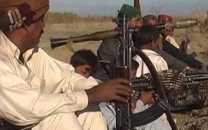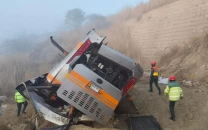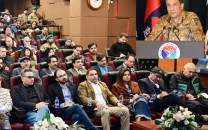Reconciliation committees: Plan to cut prosecution crashes before take-off
No cases referred to committees in 8 of 10 police stations in pilot project.

The recent police initiative to set up Reconciliation Committees to handle minor financial disputes and allegations of cheque fraud has been quietly shelved due to bureaucratic difficulties and a lack of will.
Committees were set up in 10 police stations in Civil Lines Division as a pilot project some four months ago. In eight out of these 10 police stations, not a single case has been referred by the police to the committees, said the heads of these committees.
“Four months ago, some police officials took our addresses and phone numbers. We have not heard from them since,” said Malik Faiz Rasool, president of the Mughalpura Reconciliation Committee (“though only on paper,” he adds). “I am said to be the president of this committee, but frankly, I don’t even know how many members there are.”
The committees, made up of retired bureaucrats and respected locals, were set up to arbitrate on financial disputes, such as crimes registered under Sections 489F (cheque fraud), 420 (cheating), 468 and 471 (forgery) and 406 (criminal breach of trust) of the Pakistan Penal Code.
Such cases account for a large proportion of the complaints sent to police stations. The idea to set up such committees came from Gujranwala, where they had provided “excellent results”, said Deputy Inspector General (Elite Force) Zulfiqar Cheema. He introduced the RCs to Punjab while serving as Gujranwala DIG in early 2009, having also set them up in Abbottabad in 2006.
During the DIG’s two-and-a-half year posting in Gujranwala, the police referred 7,384 registered criminal cases to RCs, of which 5,291 cases reached arbitrated settlements. A total of 29,530 criminal and civil applications were referred to the committees, of which 27,537 were resolved.
The RCs’ success was noticed and both the Punjab and Khyber Pakhtunkhwa governments decided to introduce these in their police stations. In Lahore, they were set up in Mughalpura, Qila Gujjar Singh, Ghari Shahu, Mozang, Old Anarkali, Civil Lines, Lytton Road, Race Course, Gujjarpura and Shalimar police stations. The plan was to later set up committees in the other five police divisions in Lahore.
This correspondent visited the committees at each police station and spoke to their presidents or members. In all but Gujjarpura and Shalimar police stations, the committee heads reported that not a single case had been referred to them. In these two, the committee heads claimed to be active and have a good relationship with the police, but were unable to provide any record, figures or details of cases they had handled.
Civil Lines Superintendent of Police Umar Saeed Malik insisted that all the committees were “fully active”, but added that it was very difficult to find competent members.
“That is our biggest challenge, as good people shy away from the responsibility while bad people love the power such positions give them,” he said. “This is a new concept in Lahore and will take another three or four months to flourish.”
However, DIG (Investigations) Ali Aamir Malik, who is handling the formation of committees, admitted that the plan had run into difficulties. He said that members and heads for committees at 50 police stations had been chosen, but there had been complaints that some of them were political appointments.
“We investigated and some of the complaints were valid,” he said.
The lists of members were recompiled and sent again to the capital city police officer and the commissioner, and they decided to send the lists to Special Branch for clearance, he said.
“The Special Branch then sent us a four-page form seeking details on each member of the committees,” said DIG Malik. “It is a very long and tedious process and we simply don’t have the strength for it. We have asked for one-page forms or for the responsibility to be given to SHOs.”
The DIG said that the police were now planning to establish a Financial Crimes Unit to tackle the high volume of financial fraud cases, perhaps indicating that police high-ups don’t expect the RCs to become effective any time soon.
The unit would be headed by DSP Asif Commando and 20 officers have been trained to join it, he said, adding that it would be functional by April.
Published in The Express Tribune, February 17th, 2012.



















COMMENTS
Comments are moderated and generally will be posted if they are on-topic and not abusive.
For more information, please see our Comments FAQ